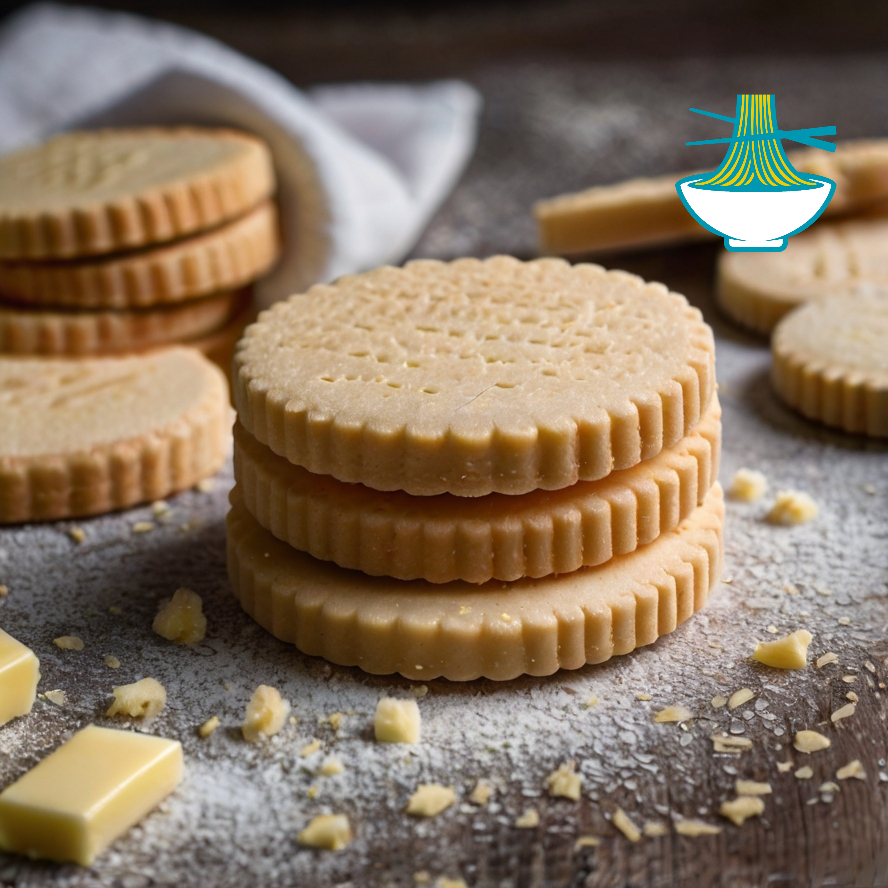Discover how to make the perfect Scottish Shortbread with this easy recipe. Made with just three simple ingredients—butter, sugar, and flour—these rich, buttery biscuits are a timeless treat. Learn the secrets to achieving that melt-in-your-mouth texture and perfect crumb in every bite. Ideal for tea time or as a delightful homemade gift.
Ingredients:
- 1 cup (230g) unsalted butter, softened
- 1/2 cup (100g) granulated sugar
- 2 cups (250g) all-purpose flour
- A pinch of salt (optional)
Instructions:
Preheat Oven: Preheat your oven to 325°F (163°C). Line a baking sheet with parchment paper.
Cream Butter and Sugar: In a large mixing bowl, beat the softened butter and granulated sugar together until light and creamy.
Add Flour: Gradually add the all-purpose flour (and a pinch of salt, if using) to the butter mixture. Mix until the dough comes together and is smooth.
Shape Dough: Turn the dough out onto a lightly floured surface. Roll it out to about 1/4-inch (0.6 cm) thickness. Use a cookie cutter or knife to cut the dough into your desired shapes.
Transfer and Bake: Place the cut-out dough pieces onto the prepared baking sheet. Bake in the preheated oven for 12-15 minutes, or until the edges are lightly golden.
Cool and Enjoy: Allow the shortbread to cool on the baking sheet for a few minutes before transferring to a wire rack to cool completely. Enjoy your delicious Scottish shortbread with a cup of tea or coffee!
Tips:
- For a touch of extra flavor, try adding a teaspoon of vanilla extract to the dough.
- To ensure your shortbread remains crisp, store it in an airtight container.
Enjoy your homemade Scottish Shortbread!
Nutritional values
Unsalted Butter (1 cup / 230g), softened
- Calories: 1,630 kcal per 230 grams
- Carbohydrates: 0 grams per 230 grams
- Proteins: 1 gram per 230 grams
- Fats: 182 grams per 230 grams (mostly saturated fat)
- Vitamins & Minerals: Contains small amounts of vitamins A, D, and E.
Benefits:
- Flavor and Texture: Adds richness, flavor, and a smooth texture to recipes.
- Baking Properties: Essential for creating the desired texture in baked goods, such as cookies and pastries.
Granulated Sugar (1/2 cup / 100g)
- Calories: 387 kcal per 100 grams
- Carbohydrates: 100 grams per 100 grams
- Proteins: 0 grams
- Fats: 0 grams
Benefits:
- Energy Source: Provides a quick source of energy through carbohydrates.
- Flavor: Adds sweetness and enhances the flavor of recipes.
All-Purpose Flour (2 cups / 250g)
- Calories: 910 kcal per 250 grams
- Carbohydrates: 190 grams per 250 grams
- Proteins: 25 grams per 250 grams
- Fats: 2 grams per 250 grams
- Vitamins & Minerals: Contains small amounts of B-vitamins, iron, and magnesium.
Benefits:
- Structure: Provides the structure and texture for baked goods.
- Nutritional Content: Contributes carbohydrates and proteins, which are important for energy and overall nutrition.
Salt (A pinch, optional)
- Calories: 0 kcal
- Carbohydrates, Proteins, Fats: 0 grams
Benefits:
- Flavor Enhancement: Enhances the flavor of baked goods and can balance sweetness.


Comments